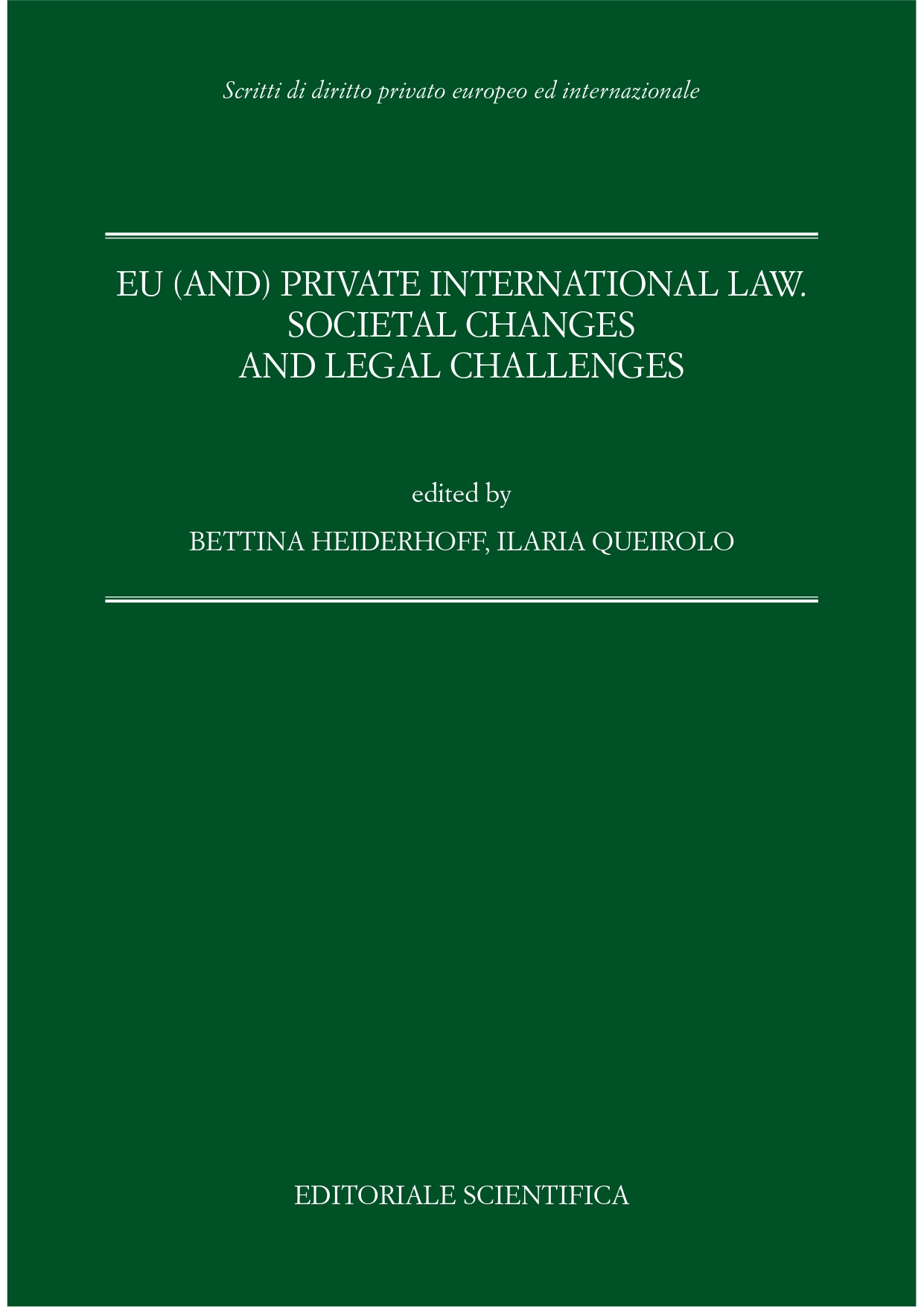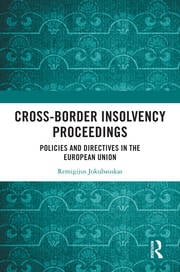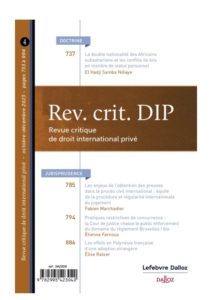The latest issue of the Journal of Private International Law was published yesterday It contains the following articles.
Alex Mills, Sustainability and jurisdiction in the international civil litigation market
The sustainability of the global economy, particularly in response to the concerns of climate change, is an issue which impacts many different aspects of life and work around the world. It raises particular questions concerning globalised industries or markets which depend on long distance transportation for their function. This article takes as its focus international civil litigation – the judicial resolution of cross-border disputes – as a particular example of a globalised market in which sustainability considerations are presently neglected, and examines how this omission ought to be addressed. It proposes a modification to English law which aims to ensure that jurisdictional decisions by the English courts take into account their environmental impact – that is to say, the environmental impact of the selection of a particular forum. The article also considers the implications of adopting this change on the position of the English courts in the global litigation marketplace, arguing that the effects are likely to be limited, and it could have an incidental benefit in promoting the development and adoption of communications technologies in judicial dispute resolution.
Saloni Khanderia, The law applicable to documentary letters of credit in India: A riddle wrapped in an enigma?
Despite significantly fostering international trade in India, letters of credit and the determination of applicable law in cross-border disputes arising from the same have received negligible attention from lawmakers. The Indian Supreme Court, too, has failed to use its power to mould the law despite regularly being confronted with disputes on this subject. This paper demystifies India’s conflict of law rules on the law governing disputes on letters of credit by examining relevant judicial trends. It highlights rampant references to the lex fori – and explores reasons why it is considered the “proper law” by being the country possessing the closest and most real contractual connection. It anticipates a “ripple effect” prompting parties to evade Indian courts through choice-of-court agreements preferring a foreign forum or to avoid business with Indian traders insisting on such payment mechanisms. Accordingly, it identifies the need for coherent rules and suggests some solutions that Indian lawmakers should consider.
Frederick Rieländer, The EU private international law framework for civil disputes concerning credit ratings: Exploring the status quo and prospects of reform
This article addresses the EU private international law framework for cross-border disputes concerning credit ratings. It argues that investors harmed by faulty ratings face considerable challenges when enforcing claims against credit rating agencies. These challenges arise not only due to the high standard of proof for damages claims and additional barriers rooted in substantive law but also from the limited territorial reach of the common EU civil liability regime of Article 35a of the amended Regulation (EC) No 1060/2009. Additionally, uncertainties concerning the determination of the concurrently applicable national law and the lack of unified European cross-border collective redress mechanisms in the area of capital markets law compound the problem. Against this background, this article discusses the options for reforming the existing private international law regime to enhance investors’ access to justice in disputes with CRAs.
Tony Ward & Ann Plenderleith Ferguson, Proof of foreign law: a reduced role for expert evidence?
This article considers the position as to proof of foreign law in the English courts in light of the case of FS Nile Plaza v Brownlie [2021] UKSC 45 and the 11th edition of the Commercial Court Guide. We discuss the “old notion” of proof by expert witnesses, the extent to which recent developments displace the traditional role of the expert and enhance that of the advocate, and the dicta in Brownlie concerning the presumptions of similarity and continuity and judicial notice. While welcoming the greater flexibility in the way foreign law can be put before the English court, we argue that the use of oral expert evidence and cross-examination will remain important in at least two types of case: those where the issue of foreign law is complex or novel, and those where the English court does not just need to ascertain the “correct” interpretation of foreign law, but rather predict whether a foreign court would in reality provide appropriate relief in relation to the matter before the court.
Olivera Boskovic, Extraterritoriality and the proposed directive on corporate sustainability due diligence, a recap
Tortious actions brought against companies for the violation of human rights and/or environmental damage have raised important issues of jurisdiction and choice of law. Damage caused abroad by subsidiaries of European companies or the possibility of bringing actions against non-European companies for damage caused outside of the European union have been referred to in terms of extraterritoriality. This paper examines these issues in relation to the proposed directive on corporate sustainability due diligence.
Leonard Lusznat, The Brussels IIb Regulation – Most significant changes compared to its predecessor and enhancement of the 1980 Hague Convention on International Child Abduction
The Brussels IIb Regulation, dealing with proceedings in matrimonial matters, those of parental responsibility and international child abduction cases, is the newest instrument of the European Union in international family law. The article critically evaluates its most significant changes compared to its predecessor, the Brussels IIa Regulation, in the fields of jurisdiction and of recognition and enforcement. In addition, it analyses how the Brussels IIb Regulation optimises the provisions of the 1980 Hague Convention on International Child Abduction between the member states of the European Union. The article argues that the regulation is overall a helpful and welcome addition to international family law because it strengthens the welfare of the child and enhances the practical functionality and normative structure of its predecessor. Nevertheless, scope for further improvements in another recast regulation is identified.
Olga Bobrzy?ska & Mateusz Pilich, Cases of cross-border child abduction in times of populism: a Polish perspective
This article analyses the case law in Poland on matters of the return of children wrongfully removed or retained within the framework of the Hague Convention of 25 October 1980 on the Civil Aspects of International Child Abduction during the period of the “populist” government (2020–2022). It takes account of the legislative and judicial developments in the EU and the European Court of Human Rights and of the aims of the Hague Convention. It seeks to ascertain whether the influence of populist reforms and politicisation of the courts has become apparent in the case law of the Polish Supreme Court on international child abduction cases.
Ye Shanshan & Du Tao, The Jurisdiction of China International Commercial Court: substance, drawbacks, and refinement
The wave of setting up international commercial courts has emerged internationally. Following the trend, China established the China International Commercial Court (CICC) in 2018. The CICC exercises consensual jurisdiction and non-consensual jurisdiction over international commercial disputes, and has jurisdiction to support international commercial arbitration. This article analyses the CICC’s criteria for determining international commercial disputes and the specific requirements for each type of jurisdiction based on the relevant provisions and judicial practice of the CICC. In addition, this article identifies the drawbacks of the CICC’s current jurisdiction system, and provides several suggestions for refinement, including the modification and clarification of the criteria for determining the internationality and commerciality of disputes, the removal of restrictions on jurisdiction agreements, the clarification of substantive standards for case transfer, and the expansion of its jurisdiction to support international commercial arbitration.
Gülüm Bayraktaroglu-Özçelik, When migration meets private international law: issues of private international law in divorce actions of Syrian migrants under temporary protection before the Turkish courts
The extended stay of Syrian nationals under temporary protection in Türkiye for more than a decade has caused an increase in their involvement in private law actions before the Turkish courts. Even though their substantive rights have mostly been regulated following their arrival, the private international law legislation has not yet been reviewed. This research, focusing on the most recent judgments of Turkish courts in divorce actions of Syrian migrants identifies important issues of private international law. These include questions on determination of international jurisdiction of Turkish courts, their access to legal aid and the obligation to provide security, questions of applicable law concerning marriage (including the recognition of the marriages validly celebrated in Syria), determination of the law applicable to divorce and the content of Syrian law. The study demonstrates that some of these questions arise because of the ongoing unfamiliarity of Turkish courts with “temporary protection status” as a relatively new concept in Turkish law, whereas others are related to application of general provisions to temporary protection beneficiaries and highlights the urgent need to review the Turkish private international law legislation considering the status of these persons to provide uniformity in court decisions and to ensure predictability.


 Germany) brings together PhD candidates for a set of seminars through the
Germany) brings together PhD candidates for a set of seminars through the 
